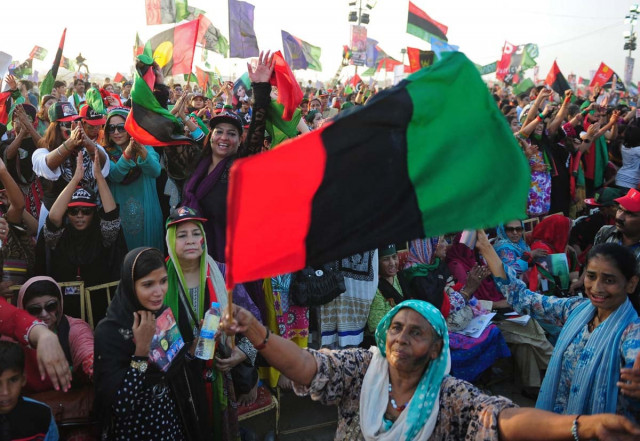The rise and fall of the PPP
PPP can win back its lost position only if it could successfully eradicate corruption & improve governance in Sindh


Bhutto was a consummate politician but at the same time, he had his failings as well, mostly rooted in his feudal origins. His biggest fault was distancing himself from the grassroots support that voted him in and increasing his dependence on the civil-military bureaucracy, which never forgave him for challenging its monopoly over power. His nationalisation policy did not go down well with the rich and the privileged. Their ganging up on him was inevitable and he fell victim to what is now known as judicial murder, sanctioned by the establishment. For the next 11 years, the party suffered incalculably, with even Begum Nusrat Bhutto being placed under house arrest and Benazir Bhutto suffering through solitary confinement in Sukkur jail. After some years, they were forced into exile. Benazir returned home triumphantly to a historic welcome in 1986, rejuvenated the party, contested and won the 1988 polls and became the first-ever woman prime minister of a Muslim country, only to be dismissed on, to date, unproven charges of corruption in 1990.
In the elections that followed, the establishment managed to get all the right-of-centre parties under one umbrella, called the Islami Jamhoori Ittehad to keep the PPP from returning to power. The party won the elections in 1994, only to be dismissed again on unproven-to-date charges of corruption. It did well in the 2002 polls while Benazir was in self-exile. But the then military ruler, General (retd), Pervez Musharraf, bought off a dozen or so PPP MNAs, consigning the party to the opposition benches. No one can doubt Benazir’s democratic credentials. She was politically astute and also a great pragmatist. The Charter of Democracy, the unwritten accommodation with the MQM and the National Reconciliation Ordinance (NRO) were the products of her pragmatism. There may be valid criticisms against the adoption of the NRO, but perhaps one should see it in light of the climate prevalent in 2007 as democratic forces struggled to wrest the country away from the clutches of a dictator. Benazir spoke out against religious extremism openly and paid the price with her own life.
After her tragic departure, the party was ‘inherited’ by her much-incarcerated husband under whose stewardship, the PPP returned to power for the third time and to the surprise of Asif Ali Zardari’s detractors, it became the first civilian government to complete its full term and transfer power to the newly elected PML-N government. While the party managed to survive the pressure from an assertive superior judiciary and a campaign launched by a big media group, its lack of governance skills compounded the incumbency factor. While in the presidency, Zardari not only failed to jettison the alleged corruption baggage that he had carried all these years, but also allegedly managed to add some more to the burden. And the worst sufferer of his failure on the governance front and the alleged corruption charges was his own province.
Even today, it is the same story in Sindh. The party can win back its lost position only if it could successfully eradicate corruption from the province, improve governance and build social and physical infrastructure instead of, as is being alleged, siphoning off the allocated resources. Bilawal Bhutto Zardari, the young chairman of the party, is too young and untested yet to deserve an assessment at this point in time. In his case, one would like to wait and see if he has inherited the political genes of his mother and his maternal grandfather.
Published in The Express Tribune, December 8th, 2014.
Like Opinion & Editorial on Facebook, follow @ETOpEd on Twitter to receive all updates on all our daily pieces.


















COMMENTS
Comments are moderated and generally will be posted if they are on-topic and not abusive.
For more information, please see our Comments FAQ